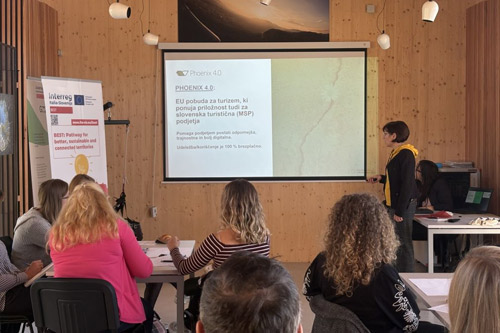
The Bled eConference, organized annually by the Faculty of Organizational Sciences at the University of Maribor, is the longest-running international event in Europe focused on the study of electronic, nowadays digital business, and is one of the leading research and professional events worldwide.
The 37th conference, held from June 9 to June 12, titled ‘Resilience Through Digital Innovation: Enabling the Twin Transition’, once again brought together numerous international participants in Bled this year.
Throughout the conference, numerous panels and workshops were held, including a workshop titled ‘Workshop: Open Data Maturity – Readiness of SMEs’, which addressed the topic of the maturity of small and medium-sized enterprises (SMEs) for using open data.
In the first part of the workshop, 17 international experts were addressed by Prof. Dr. Mirjana Kljajić Borštnar, who presented the concept of the SUPOP project (Open Data Maturity Assessment and Encouragement in Slovenian Enterprises: Methodology Development and Web-Based Solution).
In the second part of the workshop, led by Prof. Dr. Andrej Škraba, the participants used the brainstorming tool ‘Kresilnik’ to gather over 250 proposals for individual indicators based on the guiding question: “List the indicators for determining the maturity of SMEs for using open data”. The experts then categorized these ideas into 10 categories and voted on the importance of each category.
The workshop participants voted on the following order of importance of the indicator categories for determining the maturity of SMEs for using open data: 1. Business Value, 2. Data Quality, 3. Competences, 4. Innovation, 5. IT Infrastructure, 6. Internal Data Strategy of SMEs, 7. Business Environment, 8. Integration of Open Data, 9. Education, and 10. Regulation.
The findings from the workshop were not only highly informative but also served as a key directive for the SUPOP project partners in developing a multi-criteria decision model that, within the SUPOP AAT online tool, enables the evaluation, analysis, and comparison of the maturity of individual SMEs for using open data.



